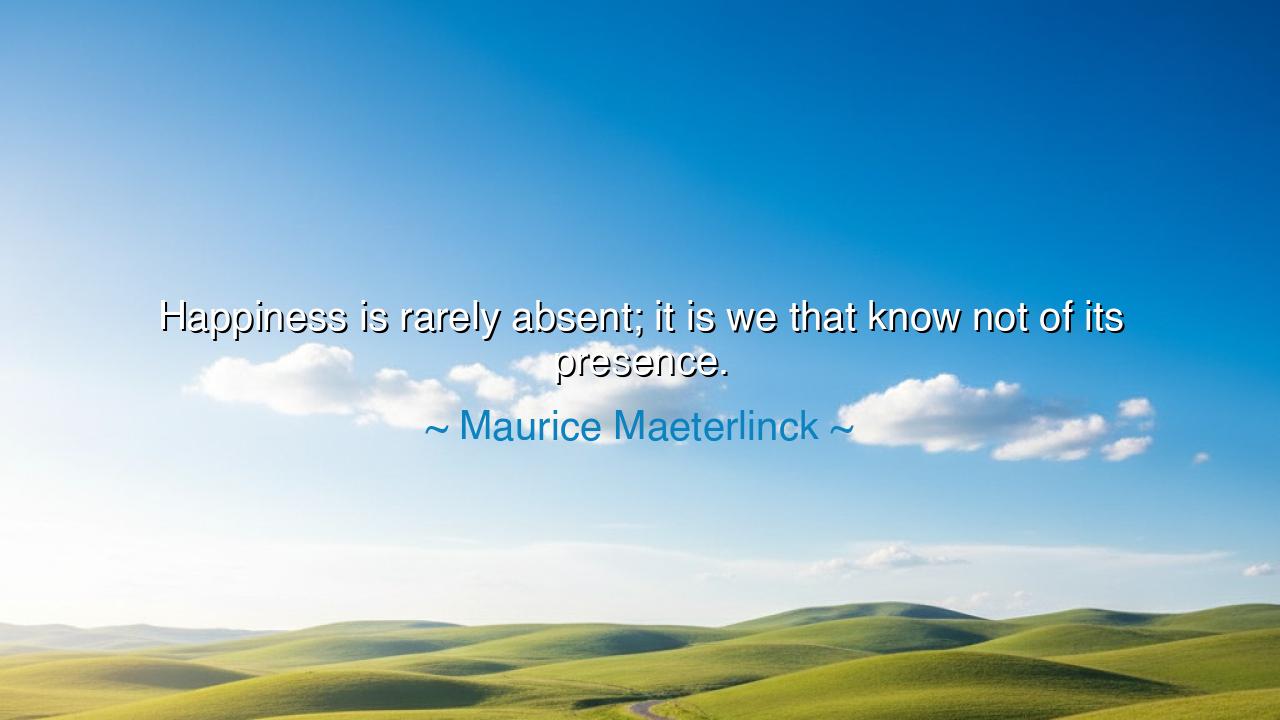
Happiness is rarely absent; it is we that know not of its






In the quiet voice of Maurice Maeterlinck, a Belgian poet and philosopher of the soul, there echoes a truth that pierces the restless heart of humankind: “Happiness is rarely absent; it is we that know not of its presence.” These words, delicate yet profound, unveil a mystery as old as life itself. For we wander, searching the earth and sky for happiness, not knowing that it walks beside us, patient and unseen, waiting only for our eyes to open. The poet does not say happiness is gone; he says it is hidden—hidden not by fate, but by our own blindness.
Through the ages, men have pursued joy as if it were a distant star. They have sought it in gold, in victory, in the embraces of others, in the fleeting triumphs of ambition. Yet, like a mirage in the desert, it fades when grasped. Maeterlinck reminds us that happiness is not a prize to be won, but a presence to be recognized. It dwells quietly in the spaces we overlook—in the laughter of children, in the scent of rain, in the rhythm of breathing, in the tender acts of daily life. It is not the thunder of achievement, but the whisper of being.
The ancients knew this truth well. The Stoic sage Epictetus taught that the secret of peace lies not in changing our circumstances, but in changing our perception. He said, “Men are disturbed not by things, but by the view which they take of them.” So too does Maeterlinck, across centuries, echo that wisdom: happiness is not absent—it is our awareness that strays. Like the sun behind clouds, joy still shines, though our thoughts obscure it. If we could but part the veil of our complaints and desires, the light would pour in.
Consider the story of Helen Keller, who, though blind and deaf, discovered a world rich with wonder. She once said that “everything has its wonders, even darkness and silence.” Deprived of what most call essential to happiness, she found contentment in gratitude, in learning, in the simple miracle of communication. Her life stands as living proof that happiness dwells not in what we have, but in what we notice. The world had not changed for her—her eyes had. She teaches us, as Maeterlinck does, that happiness is ever-present, waiting to be felt by a heart awake.
The tragedy of modern man is not that he lacks happiness, but that he has lost the art of seeing. Surrounded by abundance, he hungers still. He mistakes distraction for delight, and noise for meaning. His senses are dulled by longing for what lies ahead, and his soul forgets the quiet grace of the now. But to live fully is to awaken—to realize that happiness blooms in the very soil beneath our feet. It is the warmth of morning light, the peace of honest labor, the comfort of companionship. It is never absent; it is merely unnoticed.
Maeterlinck’s insight is both gentle and revolutionary: we are not empty; we are unseeing. The remedy, therefore, is not pursuit, but presence. To reclaim happiness, one must pause. One must breathe, listen, and look anew upon the world as if seeing it for the first time. Gratitude is the key that unlocks the hidden garden of joy. Each moment, when met with awareness, reveals its quiet beauty. The bird’s song, the shared meal, the simple kindness—all are gateways to the happiness that was always there.
So let this teaching be carried in the hearts of all who seek peace: do not chase happiness—awaken to it. The search is not a journey outward, but inward. Begin each day by asking, What good surrounds me now? What light already shines? Practice seeing with the eyes of wonder, and you will discover that joy has never left your side. For happiness is rarely absent; it is we that know not of its presence.
And so, children of the fleeting hour, learn to dwell in the eternal now. Slow your steps. Open your heart. Rejoice not only when life gives you what you desire, but when you realize you already possess more than you knew. For in that moment of awakening, you will see as the wise have always seen—that happiness was not lost, but waiting, quietly, within you all along.






AAdministratorAdministrator
Welcome, honored guests. Please leave a comment, we will respond soon